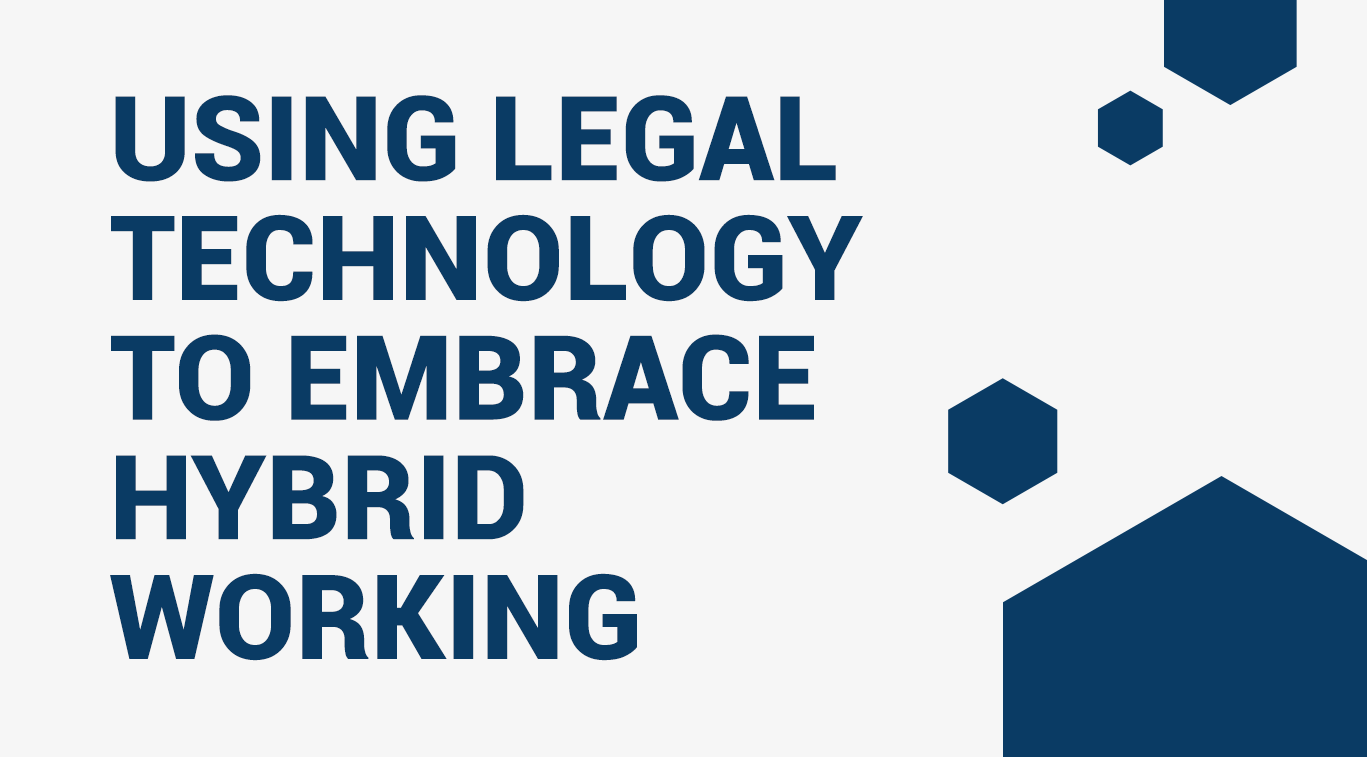Using Legal Technology To Embrace Hybrid Working

Written by Maryam Khan
Blogger

The Covid-19 pandemic has completely transformed the way we live and work. All industries had to integrate new technologies and deploy new working methods to ensure employee safety while also ensuring that business goals are being met. Remote working has become the new norm and adapting to such changing circumstances is required for most companies to remain competitive, offer their services and continue their business activities.
For the legal sector, the pandemic has called for law firms to re-evaluate their working practises, including when and how their employees will return to the office. Law firms have quickly adapted to new working practises, with firms such as Allen & Overy, Womble Bond Dickinson and Clifford Chance already establishing remote, agile and hybrid working policies [1]. Compared to other industries, the transition to remote working has been quite smooth for law firms as they took government guidance seriously and utilised the right tools and resources to mobilise hybrid working effectively [2].
The swift transition facilitated by technology has made hybrid and flexible working a popular choice amongst lawyers. Thomson Reuters‘ research indicates that 63% of the UK’s lawyers prefer to work hours of their choice, while before the pandemic, only 22% showed a preference for flexibility [3]. The same study also found that lawyers wished to work an average of 2.1 days a week at home, whereas before the pandemic, the corresponding figure was half a day [4]. Now, only one in ten lawyers want to go back to working regular hours, five days a week, in the office [5].
These statistics call for law firms to balance their employee needs and work preferences to manage their expectations and provide a better work environment. The best way to embrace hybrid working is by increasing digital investment, embracing legal technology and adopting a firm-wide culture of innovation to ensure effective communication and increased collaboration between employees as they work from home.
How has legal technology facilitated this transition?
The use of popular video conferencing platforms like Zoom and Microsoft Teams, in particular, skyrocketed globally during the pandemic. Microsoft has expressed its confidence in the future of flexible work, predicting that hybrid working structures will be disrupting the professional services industry [7]. According to their insights report, 73% of employees surveyed wanted flexible working to continue [8]. Other technologies that played a key role in facilitating this transition include smart boardroom technology, cloud computing, workflow and document management systems, legal case management systems and practice management software. Using such technological tools allows distributed teams to streamline their law firm workflow solutions, increase their efficiency and respond to their clients faster when working from home, resulting in an improved client experience.
The technologies in action
Smart Boardroom Technology
Smart boardroom technology is an innovative tool transforming the way lawyers communicate. Such software enables greater collaboration and makes it easier for employees to work from anywhere worldwide. A smart meeting room is an advanced platform that creates an incredibly productive meeting experience for participants, whether they’re joining the meeting from their office or their homes [9]. Using a smart meeting room, IT departments can analyse how the tool is used and how many meetings are held to measure its effectiveness.
A smart meeting room combines video conferencing software include smart cameras, which provide a 360-degree view of the room, allowing team members to see what is going on. This solves the issue of online meetings where some participants are in the office while others are at home. This promotes a collaborative environment and allows employees to work more creatively with the ‘whiteboard’ features. This feature is a productivity tool that allows lawyers to share ideas and visualise their thought processes with the people in the meeting [10].
Cloud Computing & Storage
Another major benefit is that lawyers can access the information they need from any device and not just their laptops. This is an excellent option for lawyers when travelling who may need last-minute access to a document from their phone.
Document Management Software
Practice Management Software
E-signature platforms
The popularity behind hybrid working
The Financial Times has concluded that millennial lawyers prioritise greater flexibility in their work as they value a good work-life balance and avoid lawyer burnout [12]. Remote working allows lawyers to choose their working hours and work from the comfort of their homes. Hybrid working models benefit not only lawyers but also their employers. The 2019 IWG Global Workplace Survey found that 85% of employers surveyed confirmed that productivity levels have increased in their business resulting from greater flexibility offered [13]. This is a great advantage for employers as increased productivity results in increased profits.
Flexible working models also enable law firms to attract a wider talent pool and build a more inclusive culture. Remorse working eliminates the geographical barrier when hiring and allows law firms to access talent worldwide. This ensures that the right candidates are hired to do the job and not the ones that simply live closer to the office. Lastly, it allows law firms to compete with their competitors, offering flexible working options. The IWG survey also reported that 80% of professionals would reject a job offer where the employer did not offer flexible working options [14]. Based on this research, if a law firm did not offer flexible working options, their talent pool to hire from would become extremely limited.
Is hybrid working in the legal sector here to stay?
Embracing legal technology has also directly contributed to law firm stability during the pandemic. The MyCase Legal Industry Report 2021 highlights that 60% of law firm profitability remained stable or increased, while 73% of the participants witnessed an increase in their productivity levels resulting from the adoption of remote legal work tools [16]. Law firms will need to continue their digital investment to stay competitive within the industry and support their long-term and short-term business goals.
The coming years will bring continued global workplace transformation, particularly within the legal sector, which has traditionally been quite slow to adapt to new technology. As remote work and hybrid working are established, future-facing law firms will continue to find ways to strengthen collaboration across dispersed work environments [17].
References
[1] Zoe Wickens, ‘Womble Bond Dickinson Launches Hybrid Work Model’, Employee Benefits (2021) at https://employeebenefits.co.uk/womble-bond-dickinson-launches-hybrid-work-model/#:~:text=Law%20firm%20Womble%20Bond%20Dickinson,of%20the%20business%20and%20
[2] Legal Futures Associate Flex Legal, ‘The Future of Work: What Hybrid Means For The Legal Industry’ (2021) at https://www.legalfutures.co.uk/associate-news/the-future-of-work-what-hybrid-means-for-the-legal-industry
[3] People in Law, ‘Almost two-thirds of the UK’s lawyers now want to work flexible hours,’ (2021) at https://peopleinlaw.co.uk/almost-two-thirds-of-the-uks-lawyers-now-want-to-work-flexible-hours/#:~:text=4%20minute%20read-,Almost%20two%2Dthirds%20of%20the%20UK’s%20lawyers%2
Covid%20pandemic.&text=The%20study%20also%20finds%20that,figure%20was%20half%20a%20day.
[4] Ibid
[5] Ibid
[6] Ibid (2)
[7] Ibid
[8] Microsoft, ‘2021 Work Trend Index: Annual Report: The Next Great Disruption Is Hybrid Work – Are We Ready?’ (2021) at https://ms-worklab.azureedge.net/files/reports/hybridWork/pdf/2021_Microsoft_WTI_Report_March.pdf
[9] Meredith Hart, ‘Everything You Need to Know About Smart Meeting Rooms’ (2019) at https://resources.owllabs.com/blog/smart-meeting-rooms
[10] Ibid
[11] LexWorkplace, ‘Best Cloud Storage For Law Firms in 2021’ (2021) at https://lexworkplace.com/best-cloud-storage-for-law-firms/
[12] Deloitte LLP, ‘No More Long Work Hours For Millennial Lawyers’ (2016) at https://www.ft.com/content/667cd618-5f0f-11e6-ae3f-77baadeb1c93
[13] IWG, ‘The Annual IWG Global Workspace Survey’ (2019) at https://old.iwgplc.com/global-workspace-survey-2019
[14] Ibid
[15] Eleanor Weaver, ‘AI Hybrid Working, And The Move Towards A More Inclusive Legal Sector’, Lawyer Monthly at https://www.lawyer-monthly.com/2021/07/ai-hybrid-working-and-the-move-towards-a-more-inclusive-legal-sector/
[16] Stikeman Elliot LLP, ‘Seven Ways to Leverage Legal Technology, Collaboration and Automation for Hybrid Work’, Lexology at https://www.lexology.com/library/detail.aspx?g=11603574-4230-46b6-b7e2-b03361b36dbd
[17] Zach Warren, ‘Legal Tech’s Predictions For Remote Work and Covid-19 in 2022’, Law.com at https://www.law.com/legaltechnews/2021/12/29/legal-techs-predictions-for-remote-work-and-covid-19-in-2022/0now%20want%20to,quarter%20before%20the%20clients.; Thomas Conelly, ‘Clifford Chance to allow lawyers to work remotely up to 50% of the time’, Legal Cheek (2021) at https://www.legalcheek.com/2021/04/clifford-chance-to-allow-lawyers-to-work-remotely-up-to-50-of-the-time/; ‘A&O recognised for new Agile Working approach’, Allen & Overy News (2020) at https://www.legalcheek.com/2021/04/clifford-chance-to-allow-lawyers-to-work-remotely-up-to-50-of-the-time/








